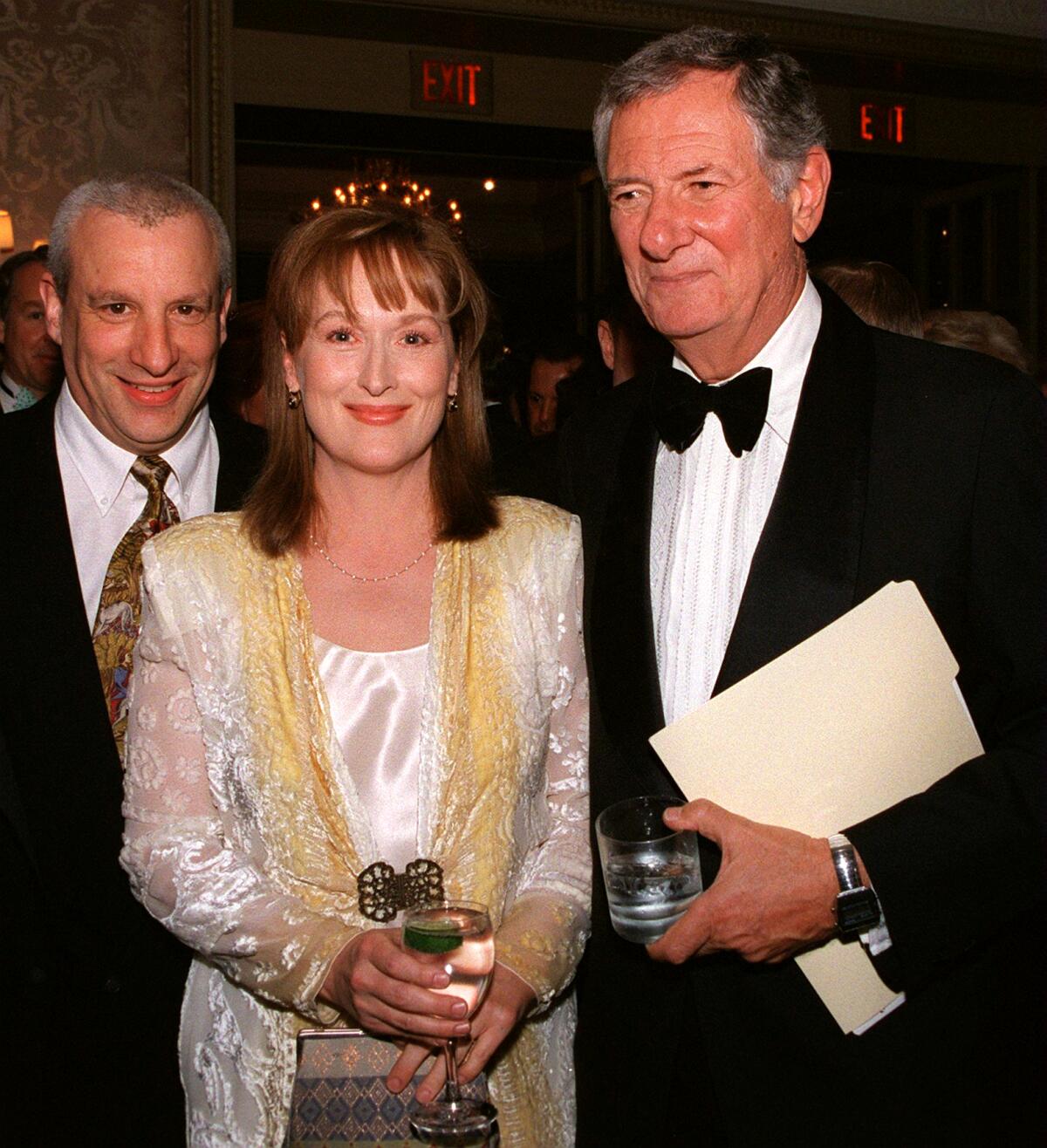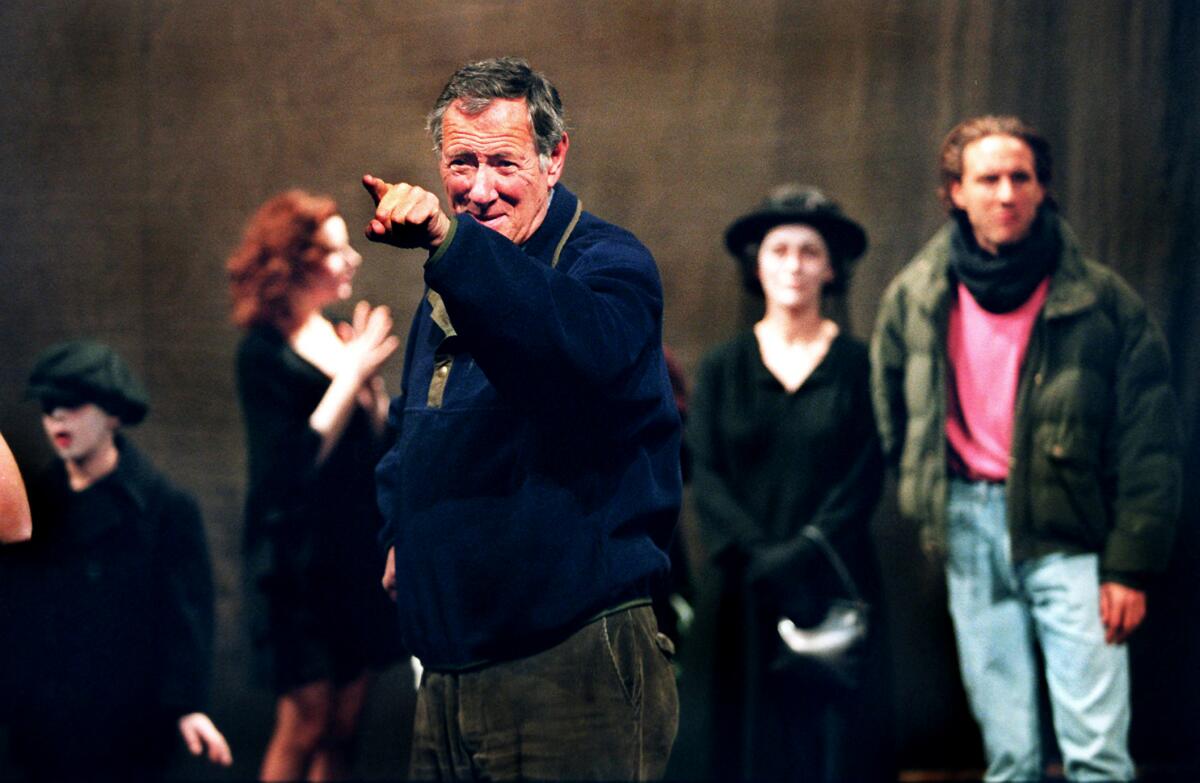Shortly after being banished, a disguised Kent flatters King Lear by telling him that he has that high quality that leads different males to observe. “What’s that?” Lear calls for. “Authority,” Kent replies, sealing his return to royal service.
Authority is a high quality that critics not way back have been proud to own. Authority rooted in data, style and judgment.
However authority now’s checked out skeptically. Experience is second-guessed by these whose essential qualification is social media entry.
Lear, who achieves true regal stature after divesting himself of all its superficial trappings, involves see “the good picture of authority” as not more than “a canine’s obeyed in workplace.” And that’s what number of see critics right now — snarling gatekeepers in want of a superb kick.
Robert Brustein, who died final month on the age of 96, was each inch a kingly critic. From the pages of the New Republic, he issued verdicts and pronouncements on the state of theater for greater than 50 years. The writer of a seminal e-book on fashionable drama (“The Theatre of Revolt”) together with collections of criticism and argumentative essays, he wielded an authority that went past the comparatively restricted scope of his media attain.
One didn’t learn Brustein to find out which Broadway reveals to purchase tickets to. One learn Brustein to grasp a play or musical in its bigger historic context and to be reminded of the creative values that guided his judgments.
A professor who refused to be an ivory tower egghead, Brustein didn’t merely reply to the artwork of his day however helped form it. Because the founding father of each the Yale Repertory Theatre and the American Repertory Theater at Harvard College, he ushered new work into the repertoire and gave modernizing life to the classics.
Adopting an artist-centered mandate that was in opposition to the box-office crucial of the industrial theater, he was in a position to put institutional cash the place his mouth was. He supported administrators, playwrights and actors who challenged the dramatic canon by deeply partaking with it.
Experimentation wasn’t ancillary however integral to his thought of a flourishing theater. Masterpieces weren’t meant to be resurrected as museum items however boldly reexamined and understood afresh. In 1967 at Yale, he introduced in Jonathan Miller to direct Robert Lowell’s radical transforming of Aeschylus’ “Prometheus Sure.” In 1984 at A.R.T., he let JoAnne Akalaitis have her approach with Samuel Beckett’s “Endgame” and defended her towards the playwright’s public repudiation.
Central to Brustein’s legacy is the way in which he reworked theater training in America. Appointed to show the Yale Faculty of Drama into one thing greater than an academy for well-born thespians, he modernized the coaching of theater artists by assembling a college of main artists and uncompromising intellectuals. When his welcome at Yale wore out, he duplicated the feat at Harvard.
His pedagogy and creative management influenced generations, together with actors Meryl Streep, Christopher Walken and Cherry Jones, playwright Christopher Durang, theater critics Michael Feingold and Helen Shaw and Broadway producer Rocco Landesman. He supported the mammoth theatrical undertakings of Robert Wilson, produced the American premiere of David Mamet’s “The Cryptogram” and was an early champion of the work of Suzan-Lori Parks.

Actors Charles Levin, left, and Meryl Streep with American Repertory Theater director Robert Brustein in 1996.
(Boston Globe through Getty Pictures)
For Brustein, creative rigor wasn’t incompatible with analytical rigor. This concept could not appear all that radical, however anti-intellectualism runs deep within the American theater. He fought tirelessly for 2 concepts which have fallen out of favor: a conservatory affiliated with a world-class skilled theater and a repertory firm that would supply actors a secure residence for creative progress.
For his contributions to the American theater, he was awarded a 2010 Nationwide Medal of Arts. Our paths crossed solely sporadically in New York and on the California Institute of the Arts, the place I educate and Brustein, who was additionally a veteran director and working towards playwright, was a visiting artist. I used to be a faithful reader of his criticism, however I didn’t all the time admire his screeds concerning the misuses of multiculturalism or his insistence that artists had extra essential issues to do than combating “social evils.”
His antipathy to the politicization of tradition didn’t totally account for the privilege that allowed him to separate these two realms. Brustein’s universalism grew ornerier and extra claustrophobic with age. He turned dogmatic in his resistance to ideology, by no means fairly acknowledging the ideological ideas that knowledgeable his worldview. He insisted that the theater undertake a post-racial posture at a time when society was nonetheless blatantly racist.
His mental feud with playwright August Wilson, which led to a extremely publicized debate at New York’s City Corridor in 1997, moderated by Anna Deavere Smith, threw these issues into disquieting aid. Brustein had complained in print that Wilson’s fixation “on the sins of the white oppressor in his mistreatment of black victims” prevented Wilson from creating “a personality who reaches any understanding of the self as a consequence of self-motivated actions.”
On the controversy stage, Brustein urged that Wilson was speaking about himself as if he have been “a 300-year-old man,” “standing on the bottom of the slave quarters.” This may increasingly have been a low level, however not even the extra edifying moments of the dialogue shed a lot mild on the important battle between Brustein’s dedication to integration and Wilson’s attraction for separatism.
Race is just not immaterial to the lack of status that critics have confronted. The sector, lengthy dominated by white males, has been pressured to reckon with its homogeneity. Brustein’s conviction that political correctness was out to “demolish our conventional requirements and values,” in order that “the very thought of ‘high quality’ is assumed to be racist,” fueled a defensiveness that might come throughout as cranky and imperious.

Director Robert Brustein rehearsing a play on the American Repertory Theater in Cambridge, Mass., in 1996.
(Barry Chin / Boston Globe through Getty Pictures)
The draw back of Brustein’s authority was its authoritarianism. Self-irony was not his robust go well with. His utopian imaginative and prescient of theater was based (and marred) by tyrannical tendencies. Purity of pursuit isn’t any assure of purity of execution. Not even so stalwart a defender of the nonprofit theater mannequin might all the time resist the temptations of the industrial world.
There’s a cause most critics aren’t additionally producers. Brustein adeptly dealt with the moral quagmire, however the look of battle couldn’t all the time be averted. Theater critic Richard Gilman, a colleague and formidable peer of Brustein’s, referred to as him out on his hyperbolic reward of Marsha Norman’s “’evening, Mom,” suggesting that the American Repertory Theater’s involvement with the play could have had one thing to do with Brustein likening the work to Eugene O’Neill’s “Lengthy Day’s Journey Into Evening.”
I come to not condemn Brustein however to reward him. The product of a distinct cultural local weather, his mannequin can not — and doubtless mustn’t — be replicated. However what’s exceptional about his essential instance — the depth and breadth of his erudition, the mental dexterity, the ethical power of his aesthetic devotion, the burning readability of his expression — shouldn’t be dismissed by an age that can’t match his rigor.
Brustein’s capacity to see the massive image whereas attending to superb particulars locations him in a class of scholar-critic that’s nearly extinct in our time. Brustein was a part of an mental custom that included Eric Bentley, Lionel Trilling and Susan Sontag — writers and thinkers who wrote with an eye fixed to the grand synthesis.
To grasp the European and American basis of recent drama, it’s essential to learn Brustein together with Bentley and Gilman. Brustein’s scholarship will outlast his polemics. His affect on artists and critics, after all, lives on. However his most enduring legacy lies in his writing.
Personally, I don’t learn Brustein for his opinions. I learn him for the sample of thoughts revealed in his prose. I learn him to grasp how we arrived at this precarious place within the historical past of the American theater. I learn him to refresh and refine my beliefs. And I learn him for the collision of concepts that assures me that progress remains to be attainable regardless of the irreparable losses.
#Commentary #Robert #Brusteins #affect #American #theater
